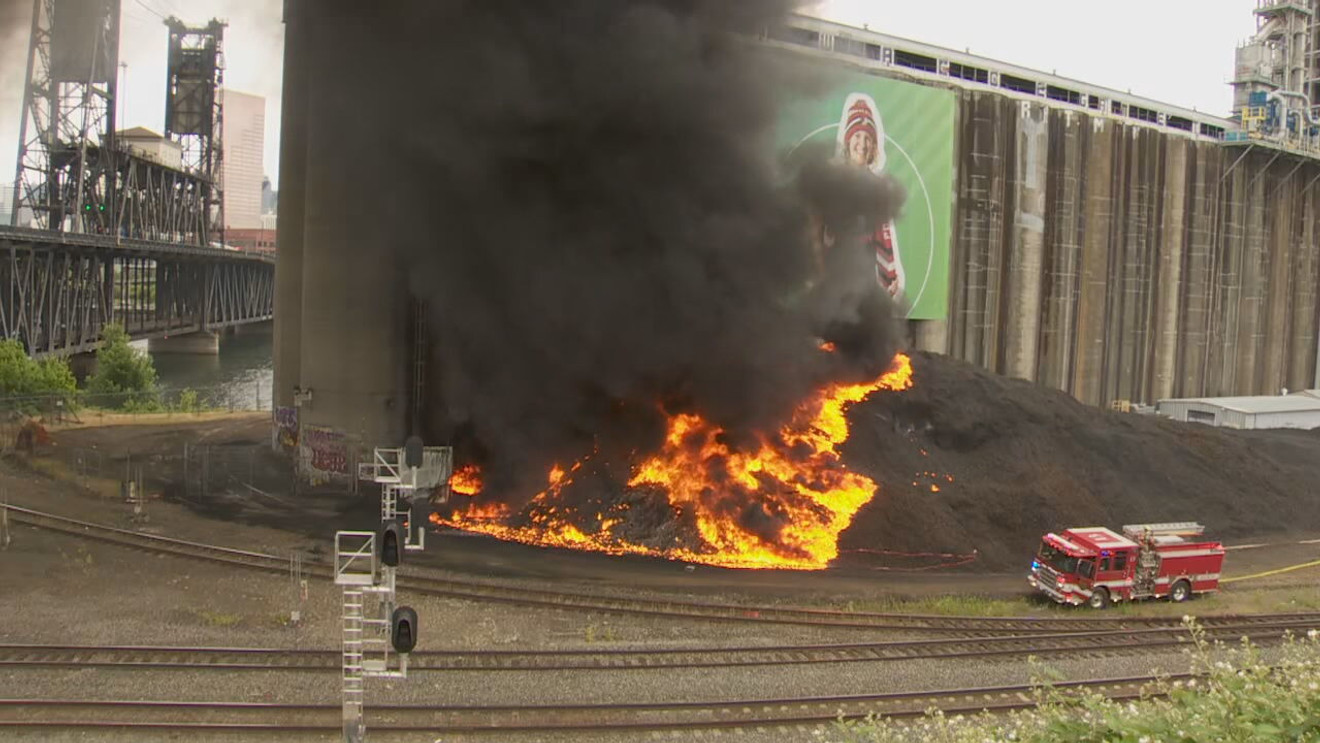The Oregon Department of Environmental Quality has fined the owners of a defunct grain terminal on the Willamette River $13,600 for storing tons of shredded tires in open-air piles without a permit.
DEQ’s action comes a month after the pile burst into flames, spewing acrid smoke in the middle of Portland. The pile reignited at least three more times as hot spots in the pile flared anew. The owners of the pile, Beau Blixseth and Chandos Mahon, load the tire shreds onto ships bound for Asia, where they are burned for fuel.
Blixseth is the son of Tim Blixseth, a Roseburg timber baron who pivoted to hospitality and started the ultra-exclusive Yellowstone Club near Bozeman, Mont., where singer Justin Timberlake and Microsoft co-founder Bill Gates are members. Mahon, a former motocross racer, owns Castle Tire Recycling, which has a tire-processing plant in North Portland.
In a letter sent to Blixseth and Mahon today, DEQ compliance manager Kieran O’Donnell says the agency made a mistake by not requiring them to have a waste-tire storage permit for the site before the fires.
“DEQ recognizes that it previously communicated that a waste tire storage site permit was not required for storage of chipped tires at this facility,” O’Donnell wrote. “Those communications were in error as applicable rules do require a permit for the storage of 200 or more cubic yards of chipped waste tires.”
On June 3, DEQ told Blixseth and Mahon that they must either remove the tire shreds or apply for a permit, giving them until June 19 to do one or the other. They did neither, DEQ says.
“To date, you have not submitted a plan to maintain less than 200 cubic yards of tire-derived product, and you have not submitted a permit application,” O’Donnell wrote. “Your response to the June 3 corrective action request asserted that your facility does not require a permit for the storage of 200 cubic yards or more of chipped tires.”
Neither Blixseth nor Mahon returned messages seeking comment.
The fine is a reversal for DEQ, whose inspectors visited the site last August and determined that it was operating legally. Asked about that determination by WW, DEQ spokeswoman Susan Mills told WW that the shreds were considered “product” not “waste,” thereby exempting the pile from waste regulations.
“Once processed, DEQ considers the shredded tires to be product,” Mills wrote to WW in July. “Since product moves (is transported/sold), it does not require a waste permit, so one is not required at the grain elevator site.”
In May, Mahon blamed the fires on vandalism. Asked for evidence, he didn’t provide any.
Blixseth and Mahon bought the defunct grain terminal in June 2019 for $2.9 million. In a series of interviews with WW last year, Blixseth said the property was a bargain. The former owner, Louis Dreyfus Co., had spent $21.5 million to renovate it, then turned around and sold it to company called Rabin Worldwide, which specializes in auctioning off industrial properties, for just $164,000.
Blixseth said he wanted to export grain from the terminal. Barring that, he would build a modernist Ferris wheel like the London Eye, or put up riverside apartments. He didn’t say anything about exporting flammable tire shreds.
